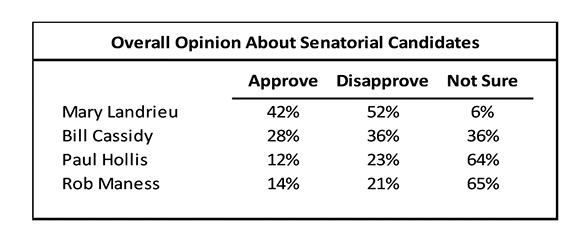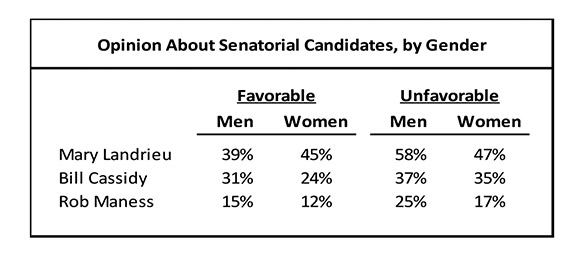On Nov. 4, voters in 36 states will go to the polls to choose a U.S. senator. Republicans currently control the House, but Democrats hold the Senate. The result is congressional gridlock.
But if Republicans pick up 6 senate seats — and polling indicates that is a possibility — they will take control of the Senate and be in a position to pass legislation changing the direction of the country.
Louisiana’s three-term senator, Mary Landrieu, holds one of those six crucial seats.
Louisiana is a red state. The voters here are very conservative — polls show only 39 percent approve of President Obama’s job performance while 56 percent disapprove — and Republicans occupy every statewide elected office except one: the senate seat held by Landrieu.
Yet the senate race is rated a toss-up.
Landrieu is a formidable opponent. She comes from a prominent Louisiana political family: her father, “Moon” Landrieu, was mayor of New Orleans and served as Secretary of Housing and Urban Development in the Carter administration. And her brother Mitch is the current Mayor of New Orleans. She has 18 years of seniority in the senate, and was recently appointed chairperson of the powerful Senate Committee on Energy and Natural Resources. She’s used this clout to take care of constituents back home.
Landrieu is known as a moderate Democrat. On a liberal/conservative political spectrum, she ranks in the middle of her senate colleagues, just to the left of liberal Republicans, but distinctly out-of-step with her conservative electorate back home on the bayou.
But she has purchased her clout in the senate by toeing the Obama administration’s line and voting for virtually every key initiative put forth by Senate Majority Leader Harry Reid.
Thus, the 56 percent of Louisiana voters who disapprove of the job the President is doing have a tough decision to make: do we “take one for the nation” by voting out a powerful senator in order to change the direction of the country, or do we return Landrieu to Washington to keep the gravy train flowing.
Opposing Landrieu are two republicans: Bill Cassidy, a physician and congressman from Baton Rouge; and Rob Maness, a retired Air Force colonel and political novice. The table at the top left shows the results of a poll taken by Public Policy Polling on June 26-29, before Republican state senator Paul Hollis dropped out of the race.
If you interpret “not sure” to be a measure of name recognition or knowledge of the candidate, the Republicans’ problem is immediately clear: few voters know the Republican candidates. Cassidy has some name recognition in his stomping grounds around Baton Rouge, Lafayette and New Orleans, but voters in the rest of the state draw a blank on him, while Maness is a newcomer running a grassroots campaign, trying to stir up a conservative base.
Cassidy is the odds-on favorite to face Landrieu in a runoff election. He is the “establishment candidate,” handpicked by the Republican Central Committee and given a sizeable war chest to challenge Landrieu. But if Maness picks up Hollis’ votes the race could become tighter than anticipated.
As long as Maness remains in the race, few expect any candidate to gain the 50 percent-plus-one votes necessary to win the election outright. Thus it will be sent to a runoff between the top two voter-getters on Dec. 6. If that happens, the race could take on added significance, because the other senate races around the country will be decided Nov. 4, and control of the Senate may come down to who wins the runoff election in Louisiana.
But regardless of who faces Senator Landrieu in the runoff, that person will have a daunting task. To start with, she enjoys a 10-point gender gap over her Republican challengers (bottom table on opposite page). I don’t know if this is because women in Louisiana are more liberal than the men, or that some women will overlook their own ideology in order to vote for a female candidate. But part of the Democrats’ electoral strategy has been to depict Republicans as anti-women, and in this race there’s a powerful and attractive female incumbent at risk.
When it comes to ethnic politics, 83 percent of African-Americans say they will vote for Landrieu, compared to just 8 percent who intend to vote for a Republican. This is nothing new. Democrats capturing 85 to 95 percent of the black vote is a given in American politics.
But when Landrieu last ran for re-election in 2008, she benefited from a huge voter turnout among blacks wanting to vote for the first black president. Most analysts believe the black turnout will be much lower for this election, which will be to Landrieu’s detriment.
But perhaps the biggest challenge is the age gap. The table at the top of this page shows that 53 percent of 18-29 year olds say they will vote for Landrieu, compared to just 23 percent who say they will vote for a Republican, with 24 percent undecided. In the table, “all Republicans” includes those who indicated they would vote for Paul Hollis. Even with these votes added to the Republican total, there is still a 30-point youth gap.
The poll results suggest that Republicans aren’t doing as well as the Democrats in getting their message to young people.
As a college professor, it was my experience that most young people today don’t read a newspaper on a regular basis, nor do they watch the evening news; instead, they rely on the internet and social media for their information.
The failure to connect with American youth is a problem for Republicans not only in this Senate race, but nationwide. Unless Republicans can find candidates who appeal to young people and can communicate with them on issues they perceive as important, the G.O.P is likely to stand for “Grumpy Old People” instead of “Grand Old Party.” If you lose the youth, you lose the future, and who wins the youth in this election could determine the future of the nation.

















Comments are closed.